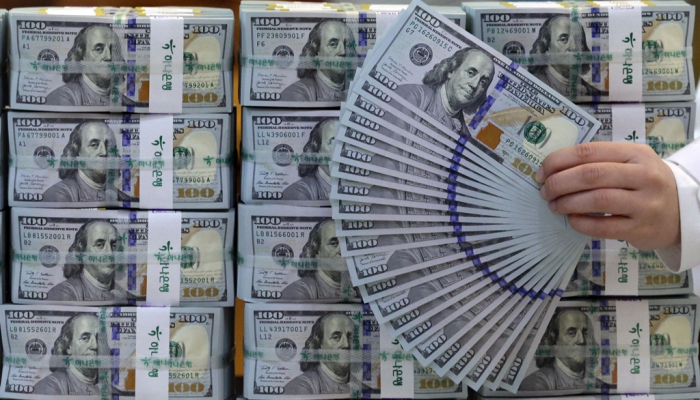Firm dollar deters Korea Inc.’s overseas acquisition deals
CJ CheilJedang reconsiders plan to buy a US firm for billions of dollars; LG Elec, Kakao drop plans for acquisitions of US companies
By Oct 13, 2022 (Gmt+09:00)
LG Chem to sell water filter business to Glenwood PE for $692 million


Kyobo Life poised to buy Japan’s SBI Group-owned savings bank


KT&G eyes overseas M&A after rejecting activist fund's offer


StockX in merger talks with Naver’s online reseller Kream


Mirae Asset to be named Korea Post’s core real estate fund operator



The firm dollar is causing South Korean companies to postpone or cancel their plans to buy overseas firms for future growth as the US currency’s appreciation has amped up acquisition costs.
There were nine takeovers of foreign firms by domestic companies in deals each worth more than 100 billion won ($70 million) with a combined value of 6.9 trillion won so far this year, according to Market Insight, the capital market news provider of The Korea Economic Daily.
Earlier this month, the country’s online platform leader Naver Corp. announced a $1.6 billion deal to take over US e-commerce operator Poshmark Inc. In July, SD Biosensor Inc., the world's largest COVID-19 test kit seller, and private equity firm SJL Partners LLC said they planned to jointly acquire Meridian Bioscience Inc., a Nasdaq-listed diagnostic company, for about $1.5 billion. SK Ecoplant Co. in February bought Singapore-based electronic waste (e-waste) disposal and recycling company TES Envirocorp Pte. Ltd for $1 billion.
Last year, local companies inked a combined 40 overseas acquisition deals worth 17 trillion won. Game developer Netmarble Corp. bought the world’s No. 3 social game publisher SpinX Games for $2.2 billion, while DL Chemical Co. acquired Texas-based specialty chemical manufacturer Kraton Corp. for $2.5 billion.
Overseas acquisitions have sharply slowed in 2022 as the dollar has risen nearly 20% against the South Korean won currency so far this year. The dollar’s strength jacks up expenses for those deals as buyers usually make payments in foreign currencies. Buyers, which aim to raise money through loans in foreign countries for takeovers, need to bear more costs due to the dollar’s gains.
The dollar/won exchange rate, which closed the South Korean currency market at 1,431.3 on Thursday, is expected to rise above the 1,500 level for the first time since the 2008-09 global financial crisis, given the US Federal Reserve’s hawkish stance to stem inflation.
RECONSIDER OVERSEAS M&A DEALS
That prompted South Korean companies to reconsider acquisition deals, which have been planned or are even in progress.
Food behemoth CJ CheilJedang Corp. will reassess a plan to buy another US company for billions of dollars following its $1.8 billion acquisition of US frozen food maker Schwan’s Company in 2019. The global electronics giant LG Electronics Inc. and South Korea’s major online platform operator Kakao Corp. dropped plans to acquire companies in the country at costs of up to billions of dollars to accumulate cash holdings.
LX Group, a spin-off from the country’s No. 4 conglomerate LG Group, has been in negotiations to buy US-listed Magnachip Semiconductor Corp. but the talks effectively failed due to a price gap between the buyer and seller.
SK Hynix Inc. has paid $7 billion so far for a $9 billion takeover of Intel Corp.’s NAND flash memory chip business. The world’s second-largest memory chipmaker dodged a bullet -- it would have spent more than 1 trillion won more due to the dollar's strength if it had delayed the payment.

BANE TO LOCALS, BOON TO FOREIGNERS
South Korean companies have been facing difficulties in pushing through major overseas acquisition deals with financial investors. PE firms need to raise money through acquisition financing or project funds, but investors have become reluctant to join their fundraising due to the surging dollar.
SJL Partners was supposed to pay for part of the SD Biosensor’s acquisition of Meridian, but it is unclear if the PE firm could raise enough money. SK Hynix was also known to have withdrawn a plan to secure more money for the Intel deal earlier this year from investors including PE firms.
On the other hand, the dollar’s strength has created better opportunities for foreign companies and PE firms to buy South Korean companies at a bargain.
Global chemicals producers and PE firms were known to have competed with Lotte Chemical Corp. for a major battery material maker Iljin Material Co. Lotte acquired the world’s fourth-largest copper foil manufacturer for 2.7 trillion won.
The Carlyle Group and other PE giants have been racing to acquire Medit Corp., the world’s third-largest 3D dental scanner maker, in a deal estimated at up to 4 trillion won.
In June, Baring Private Equity Asia agreed to buy a majority stake in the world’s largest polyimide film manufacturer PI Advanced Materials Co. for 1.3 trillion won, but there has been some concern that the Hong Kong-based PE firm may not proceed with the deal as the filmmaker’s share prices have halved.
Baring PEA was understood to have decided on the deal as the dollar’s strength reduced the acquisition costs, according to sources.
Write to Jun-Ho Cha at chacha@hankyung.com
Jongwoo Cheon edited this article.
-
 E-commerceNaver to buy Poshmark at $1.6 bn to boost US e-commerce biz
E-commerceNaver to buy Poshmark at $1.6 bn to boost US e-commerce bizOct 04, 2022 (Gmt+09:00)
2 Min read -
 Tech, Media & TelecomSK Telecom joins race for Korean dental scanner maker
Tech, Media & TelecomSK Telecom joins race for Korean dental scanner makerSep 30, 2022 (Gmt+09:00)
2 Min read -
 BatteriesLotte Chem to buy Iljin at $1.9 bn for battery material biz
BatteriesLotte Chem to buy Iljin at $1.9 bn for battery material bizSep 27, 2022 (Gmt+09:00)
3 Min read -
 Mergers & AcquisitionsSD Biosensor, SJL Partners to acquire Meridian Bioscience for $1.53 bn
Mergers & AcquisitionsSD Biosensor, SJL Partners to acquire Meridian Bioscience for $1.53 bnJul 07, 2022 (Gmt+09:00)
5 Min read -
 Mergers & AcquisitionsBaring PEA set to buy $1 bn stake in PI Advanced Materials
Mergers & AcquisitionsBaring PEA set to buy $1 bn stake in PI Advanced MaterialsJun 07, 2022 (Gmt+09:00)
2 Min read -
 Mergers & AcquisitionsKorea’s LX Group seeks to acquire Magnachip Semiconductor
Mergers & AcquisitionsKorea’s LX Group seeks to acquire Magnachip SemiconductorApr 26, 2022 (Gmt+09:00)
3 Min read -
 Mergers & AcquisitionsSK Ecoplant buys e-waste recycling firm for $1 bn
Mergers & AcquisitionsSK Ecoplant buys e-waste recycling firm for $1 bnFeb 21, 2022 (Gmt+09:00)
2 Min read -
 Korean chipmakersSK Hynix to buy Intel’s NAND business in $9 bn cash deal
Korean chipmakersSK Hynix to buy Intel’s NAND business in $9 bn cash dealOct 20, 2020 (Gmt+09:00)
3 Min read


